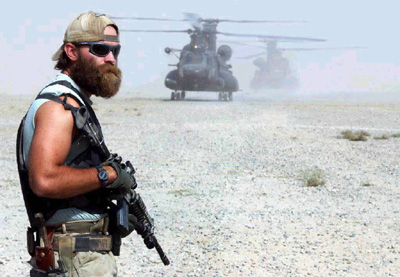How to Survive in America's Rocky Mountains – If America Falls to Foreign Forces after Terrorists Nuke a Few Major Cities – You Better Have an 'Escape' Plan
– by James Roberts - SecretsofSurvival.com –
Living in Montana, Bob English never believed 'American Hiroshima' would reach him.
When the first nuclear bomb was set off by terrorists in New York City he watched the television dumbstruck and with a level of dread for those being affected; still, he never believed anything would reach him way out west.
When the bomb went off in Washington D.C. a day later and the news aircraft caught shots of the social chaos in the surrounding Maryland suburbs - looting, etc. - he had a drink.
But when the next bomb went off in Seattle the following day - closer to his part of the world and somewhat beyond the scope of where many military strategists figured the terrorists might attack - the thought began to enter his mind.
What if they strike here?
Then the next day, Boston got a dose of terrorist hatred in the form of another nuclear suitcase bomb. Unbelievably, though, that wasn't the most horrifying news Bob came across.
You see, the newscasters told everyone something even worse. Gruesome, in fact. Outside of New York, Washington D.C, and even the Seattle suburbs were being invaded (he could only guess that Boston's suburbs would be next). Murder and who knows what else was going on by people that had been waiting to attack those just outside the nuclear detonation zones (knowing that the military would be focused on the areas being hit with bombs).
According to reports, it wasn't just Arab terrorists that were doing the damage, either. South American illegals (terrorists from Venezuela: Chavez's homeboys), Russian secret service, and even American MS-13 gang members that had supposedly helped get the terrorists across the Mexican border in the first place.
A wide scale invasion.
And when he turned the television to the local channels, at first there was static. Then an Arab man with a turban and long beard began to speak in broken English. Despite the fact that many of the words were hard to make out, the essence of what he said was unmistakable.
We have entered Montana. Resistance is futile.
The terrorists had done the unthinkable. No one would've guessed they'd come to Montana. No one.
Then Bob looked out his window at the start of 1000 miles of mountains called the Rocky Mountain Front in the distance. The Front stretched into Canada. The perfect escape for someone that knew how to survive the dangerous terrain, and just as the terrorists could survive in the mountains near Afghanistan, so could he in his hometown Rockies. Bob knew them like the back of his hand.
And as Bob went out the door with as much as he could gather in only a few minutes, he knew one thing.
That he would make it. Maybe Bob knows how to survive the Rockies, but do you?
Mountain ranges, particularly ones 100 miles long, are dangerous places. However, that's exactly the reason why one might want to escape to them in the case of an invasion (after all, invaders are unlikely to follow anyone there). So here's the question: What are some things to know about surviving the Rockies? Have your emergency pack ready to roll
This is something that has been hit on at SecretsofSurvival.com so many times it will only be delved into briefly. That said, having warm clothes, firearms (if you own them), a knife, fishing pole, tent, insulated sleeping bag, filled water canteen, and food supplies are just some of the things that it may be very wise to keep on hand.
But in the spirit of the hit television show Man vs. Wild (a great one, actually), let's pretend that you're operating under the following scenario: What if you're in the Rockies with nothing save the clothes on your back
Perhaps you were at work when the invasion hit or on the road. Maybe the invaders got so close to you that you had to take off immediately. Perhaps we're not talking about an invasion at all here.
Maybe somehow you're just lost in the Rockies with nothing to stay alive.
Well, that's where you're wrong. If you have your mind and the elements, then you have a way to survive. First thing's first: Where do you want to go?
If you're retreating into the Rockies (from invaders, let's say) then you likely want to delve deeper into the mountains (for now, anyway). However, if you're lost in the mountains then you want to get home. Both scenarios start with the following.
Find a high point and then look for a body of water.
If you're trying to retreat, going against the current toward the source of the water will likely bring you deeper into the mountains (this doesn't always work, but oftentimes it does). Further, if you're trying to get out of the mountains, follow the currents until you come to civilization. Next step, makeshift weapons
Find two stones, one thicker than the other. Take the thick one and slam it against the thinner one until it breaks.
Under most circumstances, the smaller one will have a sharp point after it's broken. Voila: A makeshift knife.
Grabbing a big and sturdy stick for a club wouldn't be a bad idea, either. After all, there are wolves, rattle snakes, and grizzly bears in the Rockies. Thus, you'd want your weapon to create distance between you and your adversary.
Of course, if your adversary is a Grizzly, you're pretty much cooked unless they lose interest. Debris Shelter
Once you decide that you have found a good spot to set up shop, here are some things to remember.
First, unless you have tools with you - and that's not the case in this scenario - you're going to have to use the elements pretty much as is. Thus, you'll want to find a knocked down tree and several strong and long logs and sticks. Perhaps put them up against a tree and again, make them as thick as possible.
This will be the basis of your debris shelter. Next, find some moss (there should be plenty of it) and cover your shelter on all sides with it. The reason for this is simple: It will make your shelter near water and wind proof, which is hugely important (temperatures in the Rockies even in September can drop below freezing at night, and the last thing you want to do is get wet).
Last, find some more moss and pine needles for the ground in your shelter. Something most people don't realize is that the majority of heat people lose under such circumstances is through the ground, and the pine and moss will help protect against this. Food
As Bear Grylls noted in a recent Rockies episode of Man vs. Wild, while you're building your shelter, be sure to check under logs for insects to eat. Insects are a great source of protein, and you'll be sure to come across worms and millipedes, amongst other things below debris. However, he also notes to make sure that each segment on the millipedes you decide to eat house four legs, not two. Because if there are two, then your millipede is a centipede. And they bite (so steer clear).
Also available for food are snakes (stay away from rattlers if you can). That said, if you do kill a rattler with your club (distance would be the key in that maneuver) make sure to cut off its venomous head and tail, peel off its skin, and take out the guts before eating.
Then, of course, there will be trout in any body of water you come across (remember that bears will also often be close to water, so proceed with caution). That said, with no fishing pole, etc., you'll need to catch fish the old fashioned way.
With your hands.
Simply sit over a rock in shallow water and wait. When you see a fish, move quickly to press it into the ground. The dirt at the bottom of the pool will help you to grasp it.
Also remember that this is extremely difficult.
That said, if you're planning to set up shop for a while in the mountains and can find a string and hook (remember that people have likely fished where you are before and they may have left things behind) that's optimal. Along those lines, don't be afraid to scavenge.
Oh yeah, and the stream will be glacially fed. Thus, it will be cold and a good source of water for you.
One other thing – keeping a long black net packed in your bag may come in handy. Simply stretching it across a shallow stream can catch you dinner in a hurry (make sure it's durable and can handle multiple use).
Finally, always remember to cook all of your meat when possible. Which, by the way, leads to the next point. Fire
When you don't have matches, always realize that making a fire is going to be difficult. That said, without one you won't be able to cook your food, you'll likely freeze, and may even be attacked by wild animals (fire scares most of them off at night).
In other words, fire is a necessity.
The good thing is that there is plenty of dry pine and spruce for you to work with. Further, kindling will not be hard to come by.
Simply use your knife to make a hole in a log. Then put a stick in it and spin the stick back in forth with both hands to try and create a spark.
Again, this is not easy. The most important thing to remember regarding wildlife
Keep food away from your camp, including scraps. Repeat: Keep food away from your camp, including scraps. Further, if you have reason to believe that a bear is nearby, particularly a Grizzly, get out of there immediately if you can. Finally, remember that the Rockies are an unforgiving place
The reality is that Grylls himself wanted to get out of the Rockies, not in. In other words, even hardened survivalists are in danger every second they're there from hypothermia and wildlife. Thus, spending as little time in the mountain range as possible is advisable.
In other words, this is a story about a worst case scenario.
And if you do ever have to 'flee to the mountains', it may be smart to plan this with a few resourceful friends.
Last tip: You may want to print this article out and keep in your backpack or in the glove compartment of your car. (Be sure to keep all important papers, maps, money, etc, in a zip-lock freezer bag, so they're not destroyed by
skip to main |
skip to sidebar











"We sleep safe in our beds because rough men stand ready in the night to visit violence on those who would do us harm." -- George Orwell
Support BlackPorter
Profile:

- Blackporter
- Preparation is not paranoia. Paranoia is the result of lack of preparation.
Tracking & Analysis Links:
Terrorism Analysts:
Alternative:
Podcasts:
ENDGAME
Glenn Beck on Mahmoud Ahmadinejad 1 of 2
Glenn Beck on Mahmoud Ahmadinejad 2 of 2
Dr. Bill Wattenburg US Nuclear Attack
Dr. Paul Williams at The Counter Terrorism Conference in Ames, Iowa.
Dr. Bill Wattenburg on American Greatness
Massive terror attack on America imminent!
Dennis on the Six Imams
Great example of what we're fighting for!
Our Future?
Have You Forgotten?
Why are we in Iraq?
Good Causes:
Web Articles:
-
▼
2007
(26)
-
▼
July
(18)
- Watch Out For Dry Runs
- Military Commander Believes al Qaeda Terror Cells ...
- Officials Worried Over Terror Sleeper Cells
- Al Qaeda & WMD Threat
- How to Survive the Last Days
- If America Falls...you'll find BlackPorter in the ...
- Chertoff's 'Gut Feeling' Could Be a Nuclear Detona...
- Al Qaeda Cell in the U.S. or On Its Way, According...
- Secret Document: U.S. Fears Terror "Spectacular" P...
- A Cautionary Tale on the Road to War
- Nuclear Alert by Ex-Head of MI5
- Are failed London Bombings designed to make us com...
- London car bomb plot: More than being reported; la...
- 2007: Nuclear Attack and Invasion of United States
- MS-13 and Islamic Radicals – Terror in Suburbs
- U.S. Drafts 'Day After' Plan for Surviving Nuclear...
- Russian Nuclear Weapons Hidden in USA During 'Cold...
- Iran, Nicaragua, and North Korea Conspiracy
-
▼
July
(18)
Terror Alert Level

Show Your Face!










